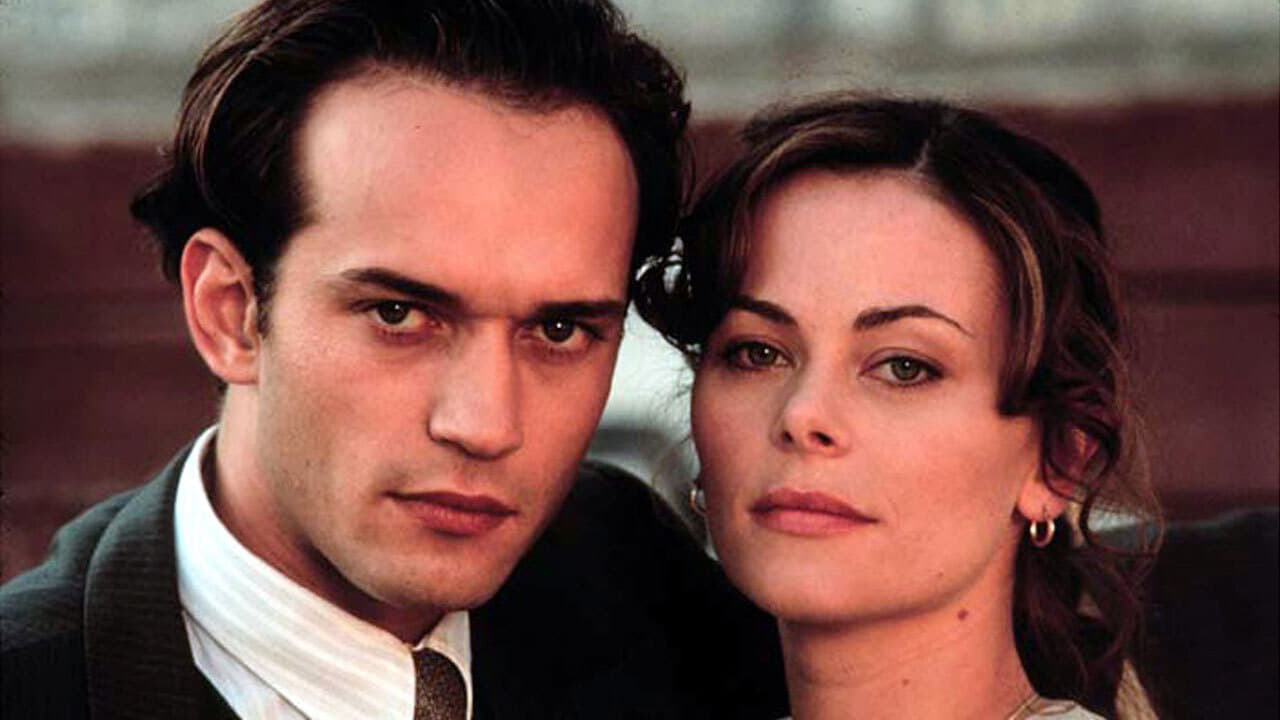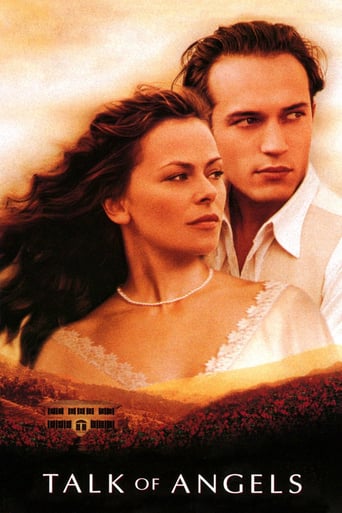

The Talk of Angels missed its title by a country mile so to speak. The expectations of the film deemed to be rather disappointing at best. Sure the cinematography was excellent. The settings were beyond belief. The actors were prepared to deliver, however the message was weak.The main character Mary, was indeed lovely in every way. She was indeed beautiful. The love scenes were poorly developed. The father was outstanding in terms of his role within the family. The son was good as well. Perhaps the story was too careful not to offend the two cultures involved in the story.The entertainment value was lost in its own sexual repression. The civil war dominance in the film apposed to the relationships on an intimate level. We needed more information on how love changes. We needed more closure on the question of love and angels to hear their voices, as do the times. I hope this story could be re=told in a more aggressive modern point of view.
... View MoreThis is a very moving and informative drama set just before the eruption of the Civil War in Spain, based on a novel by the Irish writer Kate O'Brien, who died in 1974. The story may have a partially autobiographical background. The lead character in the story is a beautiful young Irish girl, played superbly and with great dignity by Polly Walker, who goes to Spain to act as a governess to an aristocratic and wealthy Spanish family in the 1930s. While there, she becomes drawn into the desperate and fatal intrigues of a country on the brink of civil war, where families such as the one with whom she lives were themselves divided in their loyalties, with tragic consequences. When Walker arrives in Spain, she is also welcomed by a small gaggle of older Irish gals who have been 'dumped' in Spain by the Irish convents because they had disgraced themselves in some way and were considered hopeless cases best expelled to a lonely exile. Two of these stand out. One, brilliantly and evocatively played by the talented and under-rated actress Ruth McCabe, is the jovial character 'O'Toole', whose personal drama unfolds in parallel but unconnected with Walker's own. McCabe steals all the scenes she is in. The other is Agatha Conion, played by a solemn and lonely Frances McDormand, whose 'failing' in Ireland had been her lesbianism, and she stoically bears the first great love of her life, Walker, being unattainable, and even helps her with her own romance. This side of the film is all excellently observed and portrayed. But the main drama takes place in the household of the Areavaga family, who are stupendously rich and pampered aristocrats of divided political opinions. Franco Nero is marvellous as the sadly resigned, gentle, and scholarly father, whose liberal ideas are rejected by his intolerant fascist wife. Their son, romantically portrayed by the dashing Vincent Perez, shares his father's political views and is in conflict with his mother. He is married to a beautiful but ice-cold fascist girl played by Rossy de Palma. The other characters in the family are the two daughters, the older of whom is played by 24 year-old Penelope Cruz, who at the beginning of the film has to be teen-aged, and is therefore made up and dressed in such a bizarre fashion that I barely recognised her at all. The intention was presumably to disguise her age at that stage in the story, but the effect is comical. Later she is allowed to look more like herself. And for those who are curious, I can certify that Penelope is more ravishing in person than on the screen, as her personality and her glow cannot be captured on celluloid or any other medium, transmitted as they are directly through the aethre to the heart. Now we must consider for a moment the tragedy of the Spanish Civil War, which nearly ruined the country and led to such a vast amount of deaths and such horrors of destruction. It is little realized that the entire conflict was artificial, and was engineered, planned, and executed by the Nazi Government of Germany. The inside story is told by Hansjuergen Koehler, in his astonishing book of 1940, 'Inside the Gestapo', in the chapter about Spain. He was a senior defector from the SS who reported directly to Heydrich, and he was himself an active planner of the Civil War in Spain. He lays it all bare in his book, which few people have ever heard of. His account of what really happened is so shocking there are many Spaniards even today who might die of shock if they read it. Koehler reveals, amongst so much else, that Franco was only the second choice of the Germans for Spanish dictator, and that the first choice was an Admiral who let them down at the last moment and had to be replaced by Franco. Koehler makes it clear that only with the secret supply of German armaments and carefully orchestrated sabotage was Franco at last able to overthrow the Republican Government and seize power. In return, Spain became an unofficial colony of Germany for the duration of the War, supplying the Germans, by banal irony, with endless supplies of oranges! What some people will do for a supply of fresh fruit! Well, Polly Walker becomes embroiled in all these intrigues, experiences the violence of the streets and the savage murders, and the full horror of what was going on then. She falls in love with Vincent Perez, and he with her, and this merely increases the insoluble problems they all face. It is a romantic saga which sweeps one away, and it is wonderfully directed by Nick Hamm, a British TV director with a classic stage background who surely has the makings of greater things, as he displays here in extraordinary fashion. He has since directed three more feature films, none of a romantic nature, but to my mind, he would be well advised to try another project like this one, as he seems to have a rare talent for making romance less saccharine than usual (which therefore makes it more meaningful), and he should apply that ability to other romantic tales which have real grit to them, if there are any such projects available and he can get the job. There is one other thing I should say about this film, apart from mentioning its extraordinarily high production values, cinematography, and art direction, and that is the wonderful singing boy, Jose Manuel Ortigosa. He appears suddenly in a romantic scene with Walker and Perez and sings an amazing song with his guitar and then vanishes. Where did they get this kid, and what has happened to him? A wonderful touch!
... View MoreIt seems that some people still don't realise that it was Franco who was the rebel, against a democratically elected government. Part of the tension of the film stems from the fact that father and son are supporters of that government, despite its weaknesses and divisions, and that the wife/mother figure believes that Franco will save the upper classes from socialism.Penelope Cruz has a very minor role in this movie and the role of younger sister is much more important. The differing political views of the sisters are in large part a reflection of differences between the mother and father.To me the romantic element was not key to a movie which I perceived to be in equal measure about culture change and the social attitudes of the period.BTW, Polly Walker reminded me strongly of a young Sophia Loren!
... View MoreThis movie was a good effort and passable but it wasn't great. There should've been clearer evidence of why Maria went to Spain, why she needed to flee her fiance. I thought Franco Nero, the great actor that he is, should have been given a meatier role. Vincent Perez could've done so much more if only he was given the chance.The love story was rather subtle and I liked that they didn't overdo it like many other movies do. There was only one kissing scene and it wasn't shown if or not they ever consummated their love. It made you hungry for more! They didn't need a reason to fall in love, they just did. SPOILER! I thought the ending was perfect - for once, you don't see the lovers running into each other's arms for the ultimate cliched ending.The political unrest in Spain was well reflected. There was enough of it but to the oblivious like me, who never knew anything about the Franco era in Spain, maybe it would have helped if there was some clarification why there was a civil war, at least a little bit.Watch this movie for a chance to see Penelope Cruz pre-Tom Cruise days.
... View More